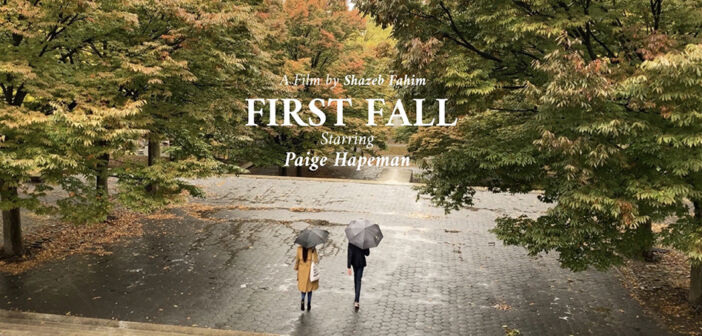Shazeb Fahim, ‘20, spent a lot of his time at Lehigh performing stand-up comedy routines.
Fahim made a name for himself winning the first Lehigh’s Got Talent in 2016 and performing routines at campus events, among other involvements.
Before graduating, Fahim capped off his on-campus stand-up career by performing his final show entitled “Debutante” in Lamberton Hall on May 2, 2019, which included a mix of old and new material.
“My aim when I first started stand-up at Lehigh was to kind of have something like that,” Fahim said. “Some sort of show that I could end on.”
Fahim said the summer of 2019 gave him the opportunity to take a break from stand-up and begin working toward making a film, “First Fall,” which he recently began sharing on Vimeo.
“First Fall,” a 1 hour 16 minute long feature film, is the first film Fahim, Paige Hapeman, ‘19, Justin San Antonio and Srini Laliwala, ‘20, have worked on together.
Fahim connected with Harper W. Harris, a sound editor and mixer in Atlanta.
Fahim served as the writer, director, director of photography, main editor and actor in the film.
Each individual served a different role throughout the filmmaking process. Hapeman acted, San Antonio was the camera operator and Laliwala was the assistant camera operator.
Written before the pandemic and completed in January 2020, ”First Fall” was created with a limited budget and resources.
To play the role of Jackie, Fahim employed Hapeman after seeing her stage acting while they were both still at Lehigh.
Fahim had pitched Hapeman the film in early 2020 with the hopes of her playing the character opposite his.
“I first saw Paige with Justin our first semester of freshman year in Clybourne Park, where she played a character who was deaf and pregnant,” Fahim said. “When I saw that performance, I knew that we had to work together on a project someday.”
Hapeman, who graduated from Lehigh with a major in international relations and minors in anthropology and sustainable development, works as a business consultant in New York City.
While she is actively working in a field that aligns with her educational background, Hapeman has ambitions to one day pursue a career in film acting.
“When you’re in a live theatre performance, you’re performing for the entire room,” Haperman said. “Whereas the camera picks up everything, so you don’t have to be as exuberant and elaborate in your acting, requiring different technique.”
San Antonio, who has been friends with Fahim since they met their freshman year at Lehigh, had never operated a camera before working on the film.
The film itself was shot on Fahim’s iPhone 11 Pro Max through the phone application Filmic Pro, allowing for low cost, yet quality production, he said.
Steve Soderbergh and Sean Baker, two filmmakers whose work Fahim enjoys and admires, have shot full length feature films completely on iPhones, which was an inspiration for Fahim.
San Antonio said because of the common nature of the iPhone camera, he felt he adapted well on the job.
Hapeman also helped film while Fahim was acting and he had done the same for her.
At times when Hapeman and San Antonio were not available, Fahim said he filmed his own scenes in a “self-portrait” fashion.
San Antonio said in addition to being the camera-operator for the film, he helped Fahim edit the script, gave him feedback on the content and scouted locations all over New York City.
“When I read the script, he obviously didn’t have the pandemic in mind or specifically filming a majority of the scenes outside,” San Antonio said. “Because the vision was to film scenes in restaurants and indoor initially, so we had to adapt to the new conditions.”
Fahim was ready to begin filming in March 2020, even though the film is set in the fall. The team began production and the initial lockdown happened that same month.
While there was a break before the team could begin working again, Hapeman said operations were more or less smooth afterwards.
“We were able to begin virtually rehearsing in the summer and resumed filming in the fall, which worked out with the original setting of the film taking place in the fall,” Hapeman said.
Since the script was written without the pandemic in mind, the team had to be strategic about how they would follow COVID-19 safety protocols while also creating the illusion of a pandemic-free world.
The majority of the filming was done on the weekends to compensate for Hapeman and San Antonio’s work schedules.
“It was beneficial because, to be safe and to do the film correctly, we had to have nobody in the frame if we had our masks off,” Fahim said. “And we had to have nobody in the frame if we didn’t want to ruin the illusion of our movie.”
Laliwala, who studied computer science and business at Lehigh, works as a software engineer but continues to make music on the side.
He and Fahim met through mutual friends and through their involvement with the South Asian Student Association.
With the team being a majority of the class of 2020 graduates, with the exception of Hapeman, the themes of the film resonated with them.
“I felt like the deeper meaning of the movie was a little bit different than simply just a story of after graduation,” Laliwala said. “It was more about the two characters rather than the circumstances of their life, which resonated with me a lot because of our reality as people living through a pandemic.”
As the film is being distributed to film festivals and viewed online it has allowed for a time of reflection on the production process, which took over a year.
“Somehow you can make a film with nothing and it will feel like a film,” Fahim said. “And I think we did that.”






Comment policy
Comments posted to The Brown and White website are reviewed by a moderator before being approved. Incendiary speech or harassing language, including comments targeted at individuals, may be deemed unacceptable and not published. Spam and other soliciting will also be declined.
The Brown and White also reserves the right to not publish entirely anonymous comments.